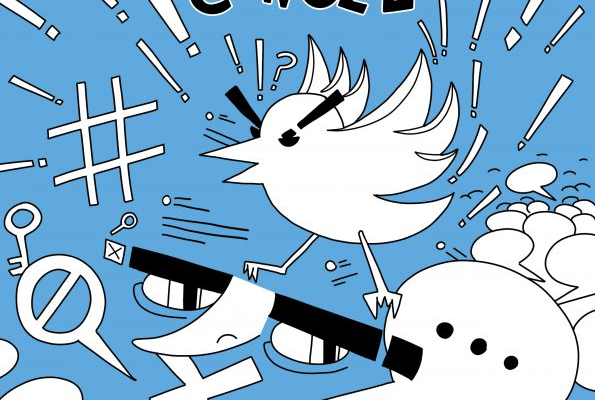What is cancel culture?

Cancel culture has become a large part of social media. Stars have to be very careful not to get “canceled” for doing something wrong. Photo by The Daily Titan
By Lisbeth Ramirez
A&E Editor
Cancel culture has been around for as long as pop culture has, but it has become more prominent in recent years. The terminology of cancel culture spread on “Black Twitter,” which is a community of predominantly Black Twitter users from the United States focusing on social issues of interest to the black community.
People started using the phrases “you’re canceled” or “______ is canceled” about a celebrity. The term “canceled” usually comes after a celebrity does something that is viewed as inappropriate. Most celebrities that are canceled receive backlash from fans and begin to lose support over time.
After the celebrity begins to receive hate, they will often post an apology on their social media platforms to try to move on and take away some of the negative attention they are getting.
Many people have become “canceled” throughout the years. One of the most high profile “cancellations” recently was that of YouTuber James Charles. Charles is a beauty influencer who creates make-up videos on YouTube and also happens to be gay. Charles was canceled after a fellow beauty YouTuber, Tati Westbrook, alleged that Charles was inappropriate to a straight waiter in her presence.
The main reason Charles was canceled was because the waiter Charles allegedly harassed leaked messages between him and Charles and claimed the YouTuber was trying to change his sexuality. All of this made his “sisters,” the name Charles has given his fanbase, upset to the point where Charles lost 3 million of his subscribers on YouTube and many people were destroying his makeup pallets.
Although Charles was canceled, it didn’t last very long. After posting a response with more leaked messages to refute the allegations, he continued with his projects and recently has begun creating content on the app TikTok. This goes to show that although sometimes a person can get “canceled” it doesn’t always last long.
An example of a celebrity who has been canceled but has not been able to regain their credibility is the rapper, R. Kelly. After a documentary series called “Surviving R. Kelly” aired on Lifetime in 2019, Kelly received backlash and many people stopped listening to his music. The series talked about how Kelly went after young girls and manipulated them into leaving their homes so he could molest them.
Before a video of him with a young girl had leaked, many people dismissed it and continued to listen to his music. This changed after the series, and many expressed their disdain for the performer on Twitter and other social media platforms. Kelly was arrested and now faces charges regarding his actions.
Another celebrity who was recently canceled by the world is Camillia Cabello. Multiple screenshots of Tumblr posts from 2015 were spread on Twitter of Cabello reblogging racist posts and saying racial slurs. People were fast to react, and the star received a lot of backlash. Cabello apologized after seeing what happened, but fans have not moved on so quickly. Some, including Cabello’s past group member Normani Hamilton, were offended by the content of these old posts.
“This represents a day in the life for us,” Hamilton said in an interview with Rolling Stone about the issue. “I have been tolerating discrimination far before I could even comprehend what exactly was happening. Direct and subliminal hatred has been geared towards me for many years solely because of the color of my skin. It would be dishonest if I said that this particular scenario didn’t hurt me.
Another case involves actress Gina Rodriquez. Rodriguez posted a video on Instagram where she was singing along with a song that uses a racial slur. She made a video in response to the hate, but it angered people more when she didn’t apologize. Instead, Rodriguez said she used it because she grew up listening to this music around African Americans.
Fans were even more upset by this, which caused Rodriguez to receive more hate. Since then, she has posted another video apologizing, but the damage was already done and many people made fun of her second video.
More celebrities get canceled than some realize, but sometimes their fan bases are so huge these instances don’t affect them in terms of status or popularity. The performer Drake is one example of this. Many were upset after he released a song that had a controversial verse about Micheal Jackson.
Some people took offense to the line, which said, “Michael Jackson Sh*t, but the palace is not for kids/still women saying it’s childish the way we live.” Jackson allegedly molested children, and some fans deemed Drake canceled because of the use of this line in his song.
Kim Kardashian and Kanye West have had a long-lasting feud with Taylor Swift. Most of this feud surrounds West’s song “Famous,” where he crassly talks about Swift, saying, “I made that b*tch Famous.” Kanye called Swift before the song’s release, but the contents of the call have been interpreted in many ways, ultimately leaving many people to label Swift as a snake and cancel her.
Recently, the entirety of the phone call has been leaked, allowing the public to hear the full story and not the snippets Kardashian released. Many fans took Swift’s side and were mad at West and Kardashian, saying the two were canceled.
Cancel culture has become a big part of social media. Sometimes it can ruin careers, but other times celebrities find a way back into the hearts of their fans, and the whole situation blows over. I think that cancel culture can be harmful and doesn’t let celebrities make mistakes. However, since celebrities are public figures, it does help them think before they speak.